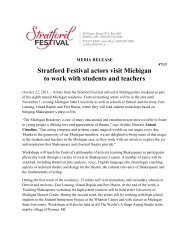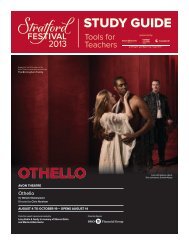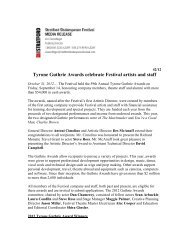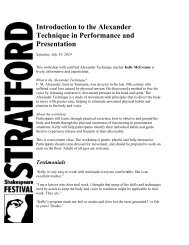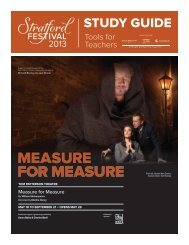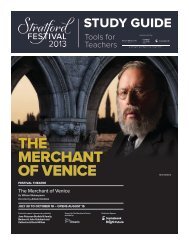Dangerous Liaisons - Stratford Festival
Dangerous Liaisons - Stratford Festival
Dangerous Liaisons - Stratford Festival
- No tags were found...
Create successful ePaper yourself
Turn your PDF publications into a flip-book with our unique Google optimized e-Paper software.
eader’s response, asserts the impossibility that<br />
people of such evil mores could have lived in the<br />
philosophical enlightenment of the current age,<br />
which, as everyone knows, has made all men<br />
honest and all women modest and reserved. This<br />
Swiftian irony, implying that licentiousness and<br />
deceit are, in fact, perennials, flavours a work<br />
destined for controversy. Hampton’s play sets the<br />
action in an autumn and winter in the 1780s. The<br />
direct encounters of characters on stage, in place<br />
of descriptions of actions in letters, intensifies its<br />
here-and-now immediacy.<br />
Happily for Laclos, whose career as an artillery<br />
officer and fortification expert was making no<br />
progress and whose literary work was judged<br />
mediocre, or worse (his comic opera Ernestine, at<br />
whose opening the ill-fated queen Marie Antoinette<br />
was present, was booed off the stage at its sole<br />
performance), his novel was pronounced in the<br />
literary press a “dazzling success.” But other<br />
voices condemned it. One contemporary, although<br />
admiring the artistry, judged it as “very black,<br />
a veritable pack of horrors and infamy.” Simply<br />
reading the novel was, according to several critics,<br />
dangerous for young people. A strikingly contrary<br />
view was expressed by the Bishop of Pavia, who<br />
told Laclos that “the work is very moral and very<br />
good to give to others to read, especially young<br />
women.”<br />
Laclos’s military superiors took an unenthusiastic<br />
view of their comrade’s work. He was recalled to<br />
boring, routine duty. Yet it was probably not only<br />
moral outrage that animated Laclos’s commanders.<br />
More offensive was his pamphlet criticizing the<br />
French military hero and master of fortification,<br />
Vauban. Likewise, during the Revolution, when<br />
Laclos put his literary talents at the service of<br />
a losing faction (that of the Duc D’Orleans) and<br />
was imprisoned on orders from Robespierre and<br />
threatened with the guillotine, his novel was of no<br />
special account. If it was, as some have thought, a<br />
satirical attack on the ancien régime, that conferred<br />
no benefit. His eventual promotion to the rank of<br />
general in Napoleon’s Revolutionary Army probably<br />
resulted from his professional expertise (he<br />
invented a new form of shell used by the navy) and<br />
lengthy service rather than political zeal, although<br />
he wrote an essay justifying continual war on<br />
France’s enemies.<br />
Attempts to understand Laclos and his one<br />
literary masterpiece – especially his relationship to<br />
3



